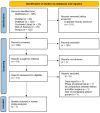Cartilage Regeneration Using Human Umbilical Cord Blood Derived Mesenchymal Stem Cells: A Systematic Review and Meta-Analysis
- PMID: 36557003
- PMCID: PMC9786930
- DOI: 10.3390/medicina58121801
Cartilage Regeneration Using Human Umbilical Cord Blood Derived Mesenchymal Stem Cells: A Systematic Review and Meta-Analysis
Abstract
Background and Objectives: Human umbilical-cord-blood-derived mesenchymal stem cells (hUCB-MSCs) have recently been used in clinical cartilage regeneration procedures with the expectation of improved regeneration capacity. However, the number of studies using hUCB-MSCs is still insufficient, and long-term follow-up results after use are insufficient, indicating the need for additional data and research. We have attempted to prove the efficacy and safety of hUCB-MSC treatment in a comprehensive analysis by including all subjects with knee articular cartilage defect or osteoarthritis who have undergone cartilage repair surgery using hUCB-MSCs. We conducted a meta-analysis and demonstrated efficacy and safety based on a systematic review. Materials and Methods: This systematic review was conducted following the Preferred Reporting Items for Systematic Reviews and Meta-Analysis (PRISMA) guidelines. For this study, we searched the PubMed, Embase, Web of Science, Scopus, and Cochrane Library literature databases up to June 2022. A total of seven studies were included, and quality assessment was performed for each included study using the Newcastle−Ottawa Quality Assessment Scale. Statistical analysis was performed on the extracted pooled clinical outcome data, and subgroup analyses were completed. Results: A total of 570 patients were included in the analysis. In pooled analysis, the final follow-up International Knee Documentation Committee (IKDC) score showed a significant increase (mean difference (MD), −32.82; 95% confidence interval (CI), −38.32 to −27.32; p < 0.00001) with significant heterogeneity (I2 = 93%, p < 0.00001) compared to the preoperative score. The Western Ontario and McMaster Universities Osteoarthritis Index (WOMAC) scores at final follow-up were significantly decreased (MD, 30.73; 95% CI, 24.10−37.36; p < 0.00001) compared to the preoperative scores, with significant heterogeneity (I2 = 95%, p < 0.00001). The visual analog scale (VAS) score at final follow-up was significantly decreased (MD, 4.81; 95% CI, 3.17−6.46; p < 0.00001) compared to the preoperative score, with significant heterogeneity (I2 = 98%, p < 0.00001). Two studies evaluated the modified Magnetic Resonance Observation of Cartilage Repair Tissue (M-MOCART) score and confirmed sufficient improvement. In a study analyzing a group treated with bone marrow aspiration concentrate (BMAC), there was no significant difference in clinical outcome or M-MOCART score, and the post-treatment International Cartilage Repair Society (ICRS) grade increased. Conclusion: This analysis demonstrated the safety, efficacy, and quality of repaired cartilage following hUCB-MSC therapy. However, there was no clear difference in the comparison with BMAC. In the future, comparative studies with other stem cell therapies or cartilage repair procedures should be published to support the superior effect of hUCB-MSC therapy to improve treatment of cartilage defect or osteoarthritis.
Keywords: cartilage regeneration; cartilage repair; human umbilical cord blood derived mesenchymal stem cells; osteoarthritis treatment; stem cell therapy.
Conflict of interest statement
The authors declare no conflict of interest.
Figures




References
-
- Williams R.J., III, Harnly H.W. Microfracture: Indications, technique, and results. Instr. Course Lect. 2007;56:419–428. - PubMed
Publication types
MeSH terms
LinkOut - more resources
Full Text Sources

